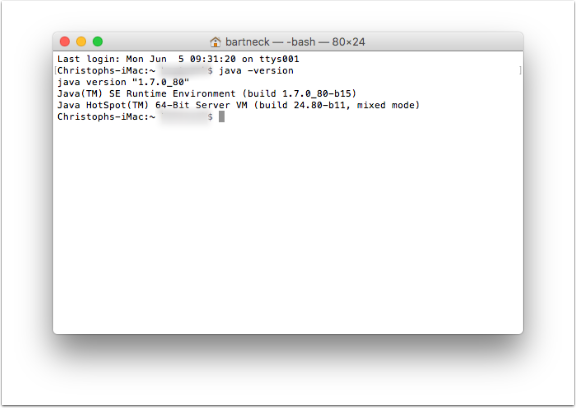
What Is The Latest Java Runtime Version For Mac
If your Mac running OS X Yosemite needs Java for application compatibility, online banking, or any of the myriad of other reasons, you can manually install one of two versions of Java that are compatible with OS X 10.10, either the latest version of JRE 8, or an older version from Apple which remains compatible with the newest version of OS X. Is Java Runtime Environment free to download? Do I really need to update Java 6 and Java 7? What are the best books to learn Java in 2017? Should I update to Java 7 on my Mac? How do I check for a Java update? Is Java named by Java coffee or Java Island?
Best wireless adapter for mac september 2017. Features of the Glam Hobby AC600 USB Wireless Adapter are: • It provides 150Mbps speed at 2.4GHz band and 433Mbps speed at 5GHz band • It supports 802.11n AC wireless standards • Dual-band connection allows you to enjoy lag-free gaming, and uninterrupted HD video streaming and Skype calls • The SoftAP allows you to create a WiFi hotspot to connect your multiple devices with the internet • Supports Windows XP/Vista/7/8/10 6) Alfa Long-Range Gaming WiFi Adapter. It streams videos and media at a lightning speed of 433Mbps without waiting for buffering and loading. Glam Hobby has designed this high-speed gaming wireless adapter to provide you an enhanced gaming experience on your computer or laptop PC.
I've installed JDK 7u7 downloaded from oracle's website. But after installation, the terminal is still showing java version 6 $java -version java version '1.6.0_35' Java(TM) SE Runtime Environment (build 1.6.0_35-b10-4) Java HotSpot(TM) 64-Bit Server VM (build 20.10-b01-428, mixed mode) any idea why java 7 is not showing up? Ans: OK, the problem has been resolved. Here is the answer: I found that my Terminal has a.bash_profile and the java home variable is set to 1.6 export JAVA_HOME='/System/Library/Frameworks/JavaVM.framework/Versions/1.6.0/Home' So this is the line causing the problem every time I opened a new terminal window. Simply remove this line will solve the problem. You still need to follow what @aleroot said, but if that doesn't work for you, check the.bash_profile (or.bashrc) setting file to see if you've previously exported any java version. Oracle's installer puts java inside the /Library/Internet Plug-Ins/JavaAppletPlugin.plugin.

And it doesn't overwrite /usr/bin/java. So, if you issue a whereis java in the terminal, it'll return /usr/bin/java. (which in turn points to /System/Library/Frameworks/JavaVM.framework/Versions/A/Commands/java, which is Apple's 1.6 version). So, if you want to use the new java version, replace the /usr/bin/java symlink so that it points to /Library/Internet Plug-Ins/JavaAppletPlugin.plugin/Contents/Home/bin/java instead: sudo rm /usr/bin/java sudo ln -s /Library/Internet Plug-Ins/JavaAppletPlugin.plugin/Contents/Home/bin/java /usr/bin. Vi ~/.bash_profile add export JAVA_HOME=`/usr/libexec/java_home -v 1.7` This tells your /usr/bin/java link target to use the latest Java 7 Package installed in /Library/Java/JavaVirtualMachines/ So for JDK 1.7.0_17 JAVA_HOME would be: /Library/Java/JavaVirtualMachines/jdk1.7.0_17.jdk/Contents/Home Note: There were a lot of change in this area recently to move Mac OS X from Appels own System integrated Java packages to Oracle based Java Packages. The above solution is working fine as of Mac OS X 10.8.2.
+1 for this answer which is imo the correct one because it works on versions of Mac OS before and after 'Java Preferences' was removed, and by showing the '-v' option it demonstrates how you can use java 6 even if java 7 is installed (which is what I want). Hence on my Mac running Lion (10.7.5) I use the same command with '-v 1.6'. This is crucial because I need Java 6 and Oracle doesnt provide one for Mac OS - only Java 7, and this allows me to use the installed JAva 6 even though Java 7 is installed. – May 20 '13 at 11:43 •. In my case, the issue was that Oracle was installing it to a different location than I was used to. Download from Oracle: • Verify that it's installed properly by looking in System Prefs: • Command-Space to open Spotlight, type 'System Preferences', hit enter.
• Click Java icon in bottom row. After the Java Control Panel opens, click 'Java' tab, 'View.' , and verify that your install worked. You can see a 'Path' there also, which you can sub into the commands below in case they are different than mine.
Disk utility for mac high sierra. I can’t even get to my desktop to delete the install and try again.
• Verify that the version is as you expect (sub in your path as needed): /Library/Internet Plug-Ins/JavaAppletPlugin.plugin/Contents/Home/bin/java -version • Create link from /usr/bin/java to your new install sudo ln -fs /Library/Internet Plug-Ins/JavaAppletPlugin.plugin/Contents/Home/bin/java /usr/bin/java • Sanity check your version: java -version. I had run into a similar issue with terminal not updating the java version to match the version installed on the mac. There was no issue with the JAVA_HOME environmental variable being set I have come up with a temporary and somewhat painful but working solution. In you.bash_profile add the line: export JAVA_HOME='/Library/Java/JavaVirtualMachines/jdk1.7.0_11.jdk/Contents/Home' (This is the path on my machine but may be different on yours, make sure to get yours. The paths should match up to /Library/Java/JavaVirtualMachines/) the run source ~/.bash_profile As I mentioned this is a temporary band-aid solution because the java home path is being hard-coded. There is really no way to set the path to get the latest as that is what Apple is supposedly doing for terminal already and the issue is that Apple's java_home environment variable is not getting updated. Since El Capitan, it is difficult to delete the /usr/bin/java symlink, because of the introduction of the new 'rootless' policy.